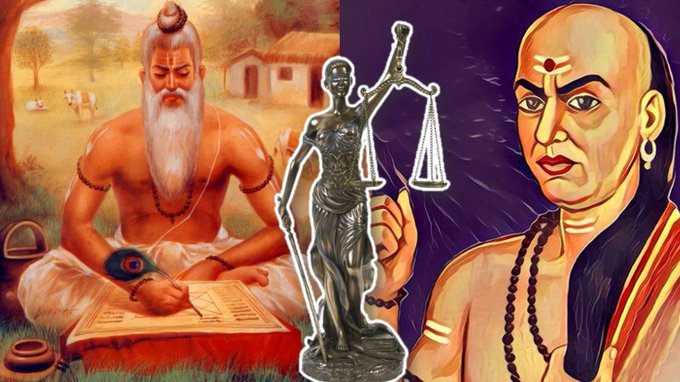
A deep dive into Daṇḍaśāstra, the traditional Indian science of punishment and legal authority rooted in dharma and statecraft.
Understanding Daṇḍaśāstra: The Ancient Indian Legal and Penal System
Daṇḍaśāstra, derived from the Sanskrit words daṇḍa (punishment) and śāstra (treatise or science), refers to the ancient Indian texts and principles concerning law, justice, and punishment. These texts are integral to the broader corpus of Dharmaśāstra, which encompasses guidelines on ethical conduct, societal duties, and legal matters.
1. The Concept of Daṇḍa in Ancient Indian Thought
In ancient Indian philosophy, daṇḍa was not merely a tool for retribution but a means to uphold dharma (righteousness) and maintain societal order. The king, or ruler, was seen as the protector of dharma, and his primary duty was to ensure justice through appropriate punishment. This concept is vividly illustrated in the Manusmṛti, which states that the king's role is to render those likely to compromise public order unable to do so, likening the necessity of a king to the necessity of a fish in water .
2. Daṇḍaśāstra and Its Role in Society
Daṇḍaśāstra served multiple purposes in ancient Indian society:
Deterrence: By prescribing punishments for various offenses, it aimed to deter individuals from committing crimes.
Rehabilitation: Certain texts emphasized the reformative aspect of punishment, encouraging offenders to mend their ways.
Restoration of Order: Punishments were seen as necessary to restore balance and order in society, ensuring that justice prevailed.
Moral Instruction: Through stories and parables, these texts imparted moral lessons, guiding individuals towards righteous living.
3. Key Texts and Sources
Several texts and scriptures delve into the principles of Daṇḍaśāstra:
Manusmṛti: One of the earliest and most influential texts, it outlines various offenses and their corresponding punishments, emphasizing the king's duty to uphold justice.
Yājñavalkya Smṛti: A significant work that discusses legal procedures, the role of judges, and the importance of evidence in adjudication.
Nāradasmṛti: Focuses on the administration of justice, detailing the responsibilities of rulers and the legal system.
Commentaries and Digests: Over time, scholars wrote commentaries (Bhaṣyas) and digests (Nibandhas) to interpret and reconcile various aspects of Daṇḍaśāstra, reflecting the evolving understanding of law and justice.
4. Types of Punishments Prescribed
The punishments in Daṇḍaśāstra were categorized based on the severity of the offense and the offender's social status:
Fines and Compensation: Monetary penalties for minor offenses.
Corporal Punishments: Physical penalties, such as whipping or mutilation, for more serious crimes.
Capital Punishment: The death penalty for grave offenses like treason or murder.
Penances: Spiritual or religious acts prescribed to purify the offender's soul.
Exile: Banishment from the community as a form of punishment and deterrence.
The application of these punishments was often influenced by the offender's caste, intent, and the circumstances surrounding the crime.
5. The Role of the King and Judiciary
In the Daṇḍaśāstra framework, the king was not just a ruler but a moral guardian:
Administrator of Justice: The king was responsible for ensuring that justice was served, often with the counsel of learned Brahmins and legal experts.
Protector of Dharma: By upholding the principles of dharma, the king ensured societal harmony and moral order.
Discretion in Punishment: While the king had the authority to impose punishments, it was advised that he consider the nature of the offense, the offender's background, and the societal impact before deciding on the appropriate penalty.
6. Evolution and Influence of Daṇḍaśāstra
Over centuries, Daṇḍaśāstra evolved:
Integration with Other Texts: It became intertwined with other dharma texts, leading to a comprehensive legal and ethical system.
Regional Variations: Different regions developed their own interpretations and applications of Daṇḍaśāstra, reflecting local customs and values.
Modern Relevance: While ancient in origin, the principles of Daṇḍaśāstra continue to influence contemporary discussions on law, justice, and ethics in India.
7. Criticisms and Contemporary Perspectives
While Daṇḍaśāstra provided a structured legal framework, it has faced criticisms:
Caste-based Discrimination: The varying punishments based on caste have been a subject of ethical debates.
Harsh Penalties: Some punishments, especially corporal and capital ones, are viewed as inhumane by modern standards.
Gender Bias: Certain texts reflect patriarchal views, limiting women's rights and freedoms.
Modern interpretations seek to adapt the core principles of Daṇḍaśāstra to contemporary values of justice, equality, and human rights.
Multiple-Choice Questions (MCQs)
What does the term 'Daṇḍa' primarily signify in Daṇḍaśāstra?
a) Reward
b) Punishment
c) Law
d) Dharma
Answer: b) Punishment
Which text is considered one of the earliest and most influential in outlining the principles of Daṇḍaśāstra?
a) Yājñavalkya Smṛti
b) Nāradasmṛti
c) Manusmṛti
d) Arthashastra
Answer: c) Manusmṛti
In the context of Daṇḍaśāstra, who was primarily responsible for administering justice?
a) Brahmins
b) Kings
c) Merchants
d) Priests
Answer: b) Kings
UPSC-Level Questions
Discuss the concept of Daṇḍaśāstra in ancient Indian legal tradition. How did it influence the administration of justice in early Indian societies?
Analyze the evolution of Daṇḍaśāstra over time. What are its contemporary implications in the context of Indian legal and ethical systems?
Critically examine the criticisms of Daṇḍaśāstra, especially concerning caste-based discrimination and gender bias. How can modern interpretations address these issues?
Leave a Comment
12-Jun-2025 05:15 PM
An insightful exploration of the Varnashrama system—its origins, principles, and how it shaped both societal roles and spiritual growth in ancient India.
12-Jun-2025 05:01 PM
A comprehensive look at the four Purusharthas—Dharma, Artha, Kama, and Moksha—and their relevance in shaping ethical, purposeful living.
12-Jun-2025 04:51 PM
A deep dive into Daṇḍaśāstra, the traditional Indian science of punishment and legal authority rooted in dharma and statecraft.
12-Jun-2025 11:11 AM
An in-depth look at Dharmashastra — the ancient Hindu code that governed law, ethics, and everyday conduct for centuries.
12-Jun-2025 10:56 AM
Unravel the legend and legacy of Manu — the progenitor of humanity, the giver of laws, and the pillar of Vedic civilization.
07-Jun-2025 05:39 PM
India has added four new wetlands to the Ramsar list, bringing the national total to 89. This move boosts ecological preservation efforts, with Tamil Nadu...